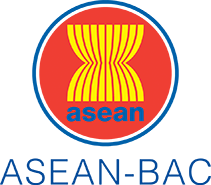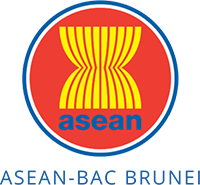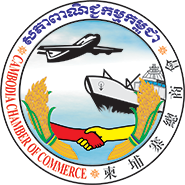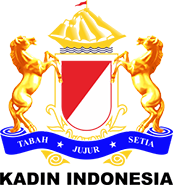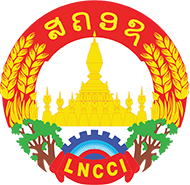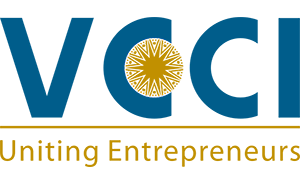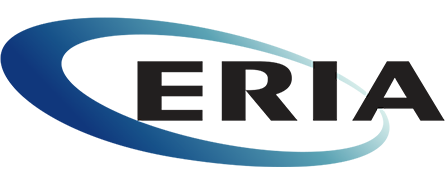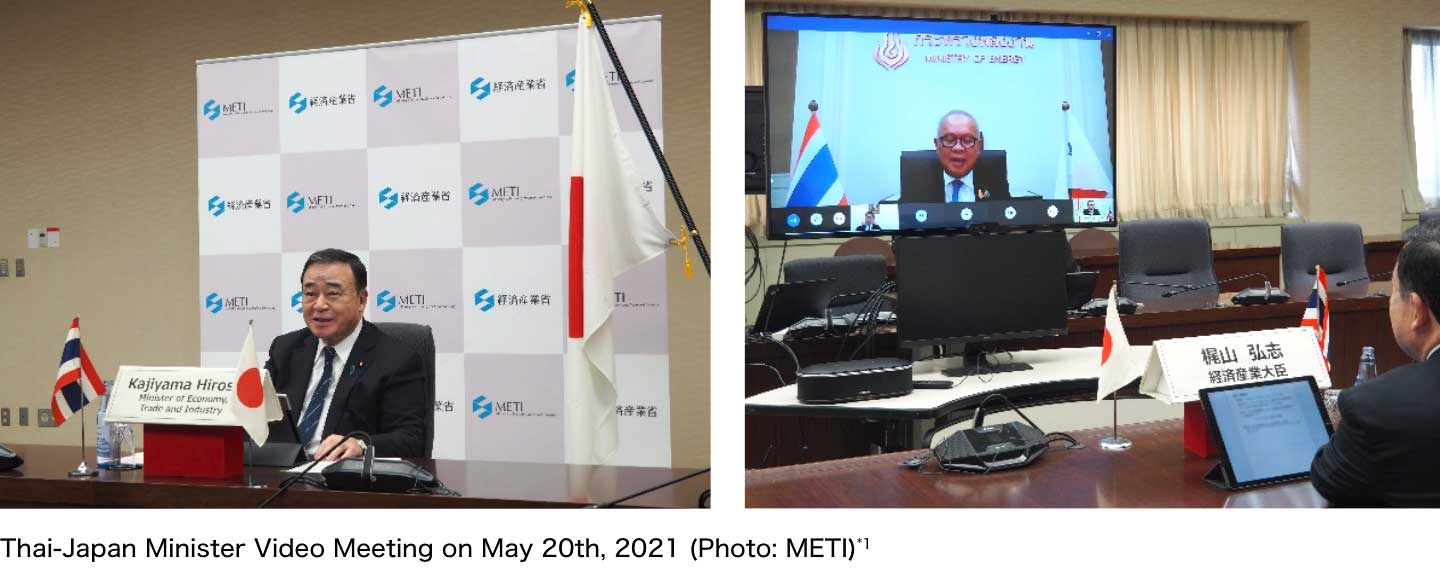
Volume 8 – June 2021
Greetings from DISG Secretariat
Dear Readers,
Hope you are safe and well.
First of all, I would like to express my sincere appreciation for all of you who participated in our first “ASEAN-Japan Business Week” held last week (24th-28th May). I also wish to express my deepest gratitude to JBF (Keidanren), JCCI, METI, JETRO, RIETI, ASEC, ASEAN-BAC, AJBC, ERIA, and my colleagues in AMEICC Secretariat, who jointly hosted the event and made it successful.
Thanks to the distinguished speakers and panelists both from ASEAN region and Japan, with business, academic and public background, we had extremely insightful discussion and dialogue and shared a lot of takeaways to jointly realize innovative and sustainable growth towards the future.
Among a lot of highlights was the opening speech delivered by Minister Kajiyama Hiroshi of METI Japan, where he made a new announcement about “Asia Energy Transition Initiative”, which would support ASEAN members’ effort in achieving their carbon-neutrality by helping their development of roadmaps towards respective goals and also by funding their deployment of clean energy technology. Another highlight was a speech by H.E. Dato Lim Jock Hoi, Secretary-General of ASEAN, who shared his expectation to Japanese business such as continued and expansion of manufacturing in ASEAN region, recovery and enhancement of supply chain with digital technologies, and increasing of sustainable investment. This Newsletter gives you more details.
Total number of the registration was more than 2,500 and we saw hundreds of attendees for every session throughout 5 days. I believe this huge success will bring good momentum to our ongoing DISG activities and accelerate ASEAN-Japan cooperation.
Other topics covered in this Newsletter include the announcement of the second call for applicants for “the Financial Support Program for Strengthening Asia Digital Transformation (ADX)”, illustrative introduction of an ADX Project in the Philippines, and government-to-government top-level engagement between ASEAN countries and Japan. Hope you enjoy reading them.
Best regards,
KOBAYASHI Hirokazu
Chair of AMEICC DISG Task Force
Executive Director, JETRO Singapore
Highlights of “ASEAN-Japan Business Week”-

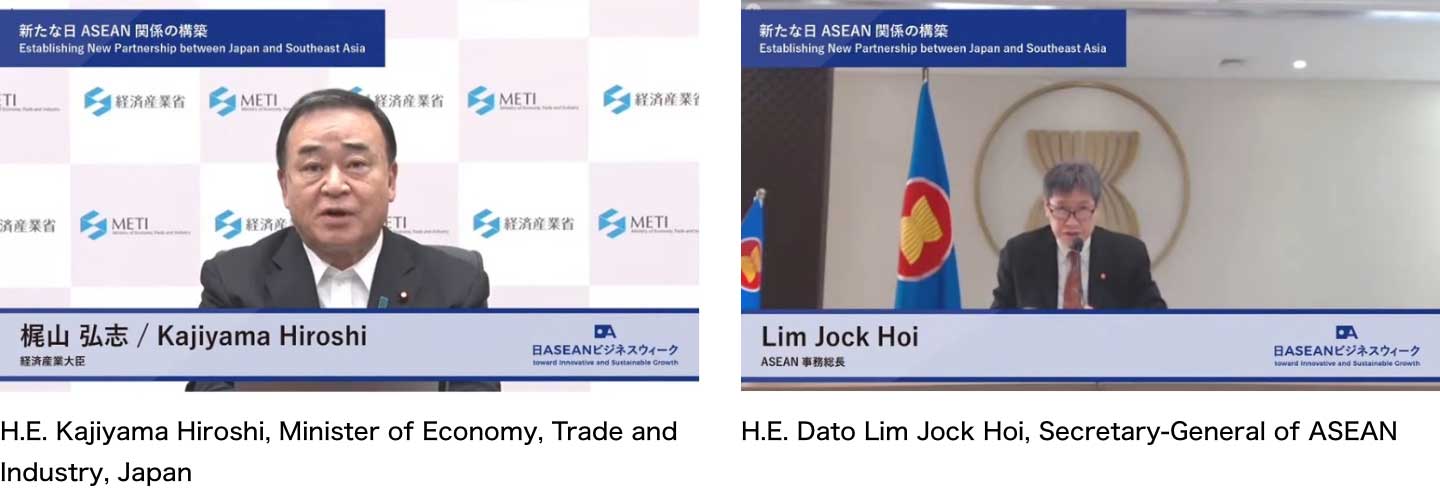
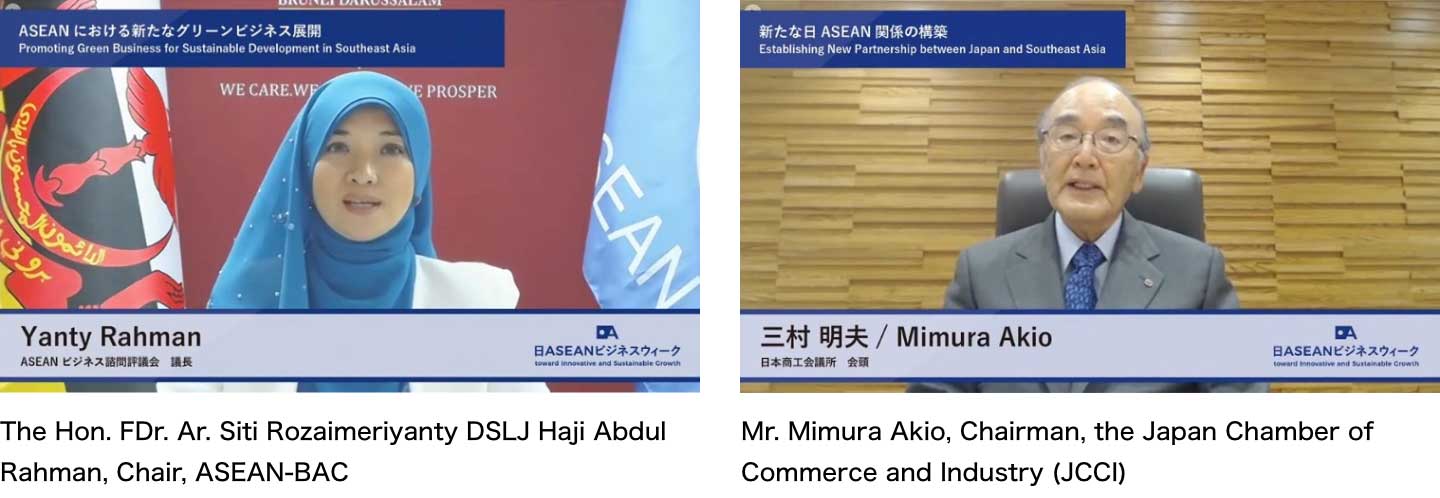
From 24th to 28th May 2021, METI, in cooperation with JBF(Keidanren), JCCI, JETRO, RIETI, ASEC, ASEAN-BAC, AJBC, ERIA, and AMEICC Secretariat, held an online event named “ASEAN-Japan Business Week”. A lot of insightful and forward-looking discussions and opinions were made through the week covering wider topics such as new ASEAN-Japan partnership, SDGs, SMEs, Green business and Energy Transition, relationship with US and China, opportunities for post-COVID-19, startups and DX, and BCG (Bio-Circular-Green) economy in Thailand.
On Day 1 (24th May), in the opening remarks, H.E. Kajiyama Hiroshi, Minister of Economy, Trade and Industry mentioned evolving ASEAN-Japan economic partnership and importance of “Innovation” and “Sustainability” for future win-win relationship between ASEAN and Japan. Besides, he announced new cooperation initiative, “Asia Energy Transition Initiative (AETI)”, which includes a variety of support to efforts by ASEAN members in achieving carbon neutrality. Under this initiative, Japan will provide a package of concrete support measures based on the following five pillars:
1) Support drawing roadmaps for energy transitions
2) Asian version of transition finance
3) US$10 billion finance support
4) Technology development and deployment, utilizing the achievement of 2 trillion yen fund
5) Capacity building of decarbonisation technologies, and knowledge sharing through Asia CCUS network
After Minister Kajiyama, H.E. Dato Lim Jock Hoi, Secretary-General of ASEAN gave a speech where he shared his expectation to Japanese companies; 1) continued and expansion of manufacturing in ASEAN, 2) recovery and enhancement of supply chain with digital technologies, and 3) increasing of sustainable investment.
After that, Mr. Mimura Akio, Chairman of JCCI and two other leaders from JETRO and JBF also provided speech and shared their view on future ASEAN-Japan partnership, contribution from Japanese business and expectation for further collaboration with ASEAN business.
From Southeast Asia famous tech company, we had Mr. Shawn Heng, Managing Director, Regional Business Development & Grab for Business, Grab Holding Inc, who delivered keynote speech entitled “Envisioning the Future of the Region with 650 Million People”. Then, key figures from Japanese business, made speeches on the theme of “Transforming Southeast Asia, Transforming Japanese Business”.
On Day 2 (25th May), two sessions focused on SDGs and MSMEs were held. ISEAS-Yusof Ishak Institute and RIETI co-organized the first session entitled “SDGs and Business Contribution in Southeast Asia”. Experts from ISEAS and Japanese companies joined and gave their insightful ideas.
In the latter part, JCCI led the special session for MSMEs. Several speakers from Japanese MSMEs introduced their business experience in SEA and they gave us hints for other Japanese MSMEs to find new business opportunity in the region.
On Day 3 (26th May), the session entitled “Promoting Green Business for Sustainable Development in Southeast Asia” was held where the speakers discussed on importance of Asia Transition Finance, and new opportunity and commitment to achieve carbon neutrality for the manufacturing industry. In the opening remarks, we had Mr. Hirose Naoshi, Director-General, Trade Policy Bureau, METI, Mr. Sugimori Tsutomu, Vice Chair of JBF (Keidanren) and The Hon. FDr. Ar. Siti Rozaimeriyanty DSLJ Haji Abdul Rahman, Chair of ASEAN-BAC. Ms. Yanty delivered a comprehensive and encouraging message for ASEAN-Japan economic cooperation especially in the fields of sustainable growth and green business.
After that, Dr. Han Phoumin, Senior Energy Economist, ERIA delivered keynote speech where he shared ERIA’s latest study on decarbonization scenarios in ASEAN and emphasized that decarbonization pathways must be different across regions considering natural resources and the affordability.
Then we had two panel discussions whose themes were “The importance on Asia Transition Finance” and “Exploring New Business Opportunity in Southeast Asia and the Commitment to Achieve Carbon Neutrality for the Manufacturing Industry”.
On Day 4 (27th May), we had discussion on international politics and economics surrounding Southeast Asia, especially from the perspectives on its relationship with the US and China. We had another session organized by JETRO in which presidents of JETRO branches in ASEAN region gave us the latest business information of each country and discuss under the theme of “New Trends of Innovation and Sustainability in the Post-COVID-19 Era & Direction toward ASEAN-Japan further Collaboration”.
On Day 5 (28th May), JETRO continuously organized two special sessions. In the first one, various ASEAN startups delivered pitch presentations towards further collaboration with Japanese companies. We had SOCASH Software (Singapore), and Wahyoo (Indonesia) from retail industry, SWAT Mobility (Singapore) and PhenikaaX (Vietnam) from mobility industry, and eDoctor (Vietnam) and HealthMetrics (Malaysia) from healthcare industry. They introduced their innovative solutions and existing collaborations with Japanese companies as well as expectations for future alliance. In succession, at the end of ASEAN-Japan business week, we had a session entitled “New Business Opportunities in BCG (Bio-Circular-Green) Sector in Thailand”. Ms. Duangjai Asawachintachit, Secretary General, Office of the Board of Investment, Thailand, introduced “BCG Economy” as Thailand’s new national policy. Then we had a panel discussion on how to expand BCG business in Thailand for Japanese business.
Please see here for the event special site including information of whole program detail and archived videos of each program. We’ll upload here the summary of the event shortly.
* JBF: Japan Business Federation, JCCI: Japan Chamber of Commerce and Industry, JETRO: Japan External Trade Organization, RIETI: Research Institute of Economy, Trade and Industry, ASEC: ASEAN Secretariat, ASEAN-BAC: ASEAN Business Advisory Council, AJBC: ASEAN-JAPAN Business Council, ERIA: Economic Research Institute for ASEAN and East Asia, AMEICC: AEM-METI Economic and Industrial Cooperation Committee
The 2nd Call for applicants for “the Financial Support Program
for Strengthening Asia Digital Transformation (ADX)”
On 25th May, 2021, the call for the second batch for “the Financial Support Program for Strengthening Asia Digital Transformation (ADX)” was opened*1. ADX project is the financial support program, funded by METI Japan and one of the flagship projects among ASEAN-Japan Economic Resilience Action Plan, aims to promote digital innovation to solve various socio-economic challenges in ASEAN including ones brought by COVID-19 and covers expenses for demonstration projects on digital technologies carried out by Japanese and ASEAN companies jointly. On 14th October, 2020, 23 projects were selected as the first batch*2 from various sectors including medical & healthcare, agriculture, fisheries, tourism & mobility, environment & energy, and manufacturing & HR.
For the second batch, target number of projects selected will be approximately 15. Project requirements are; 1) To specifically identify socio-economic challenges in the country and contribute to solution of them, 2) To use digital technologies which contribute to promoting 4th Industrial Revolution, 3) To identify ASEAN company/ institution as the project partner, and 4) To be expected that the business operation will start or continue early (generally within two years after the completion of the PoC) in the target country or other ASEAN region. Application deadline is set as 15th June, 2021. For more details, please see this briefing material (available both in Japanese and English).
*1 Please see here the outline of the call for applicants (Japanese only)
*2 Please see here for the result of the 1st call (list of 23 projects)
ADX Project Introduction in the Philippines (Challenergy)
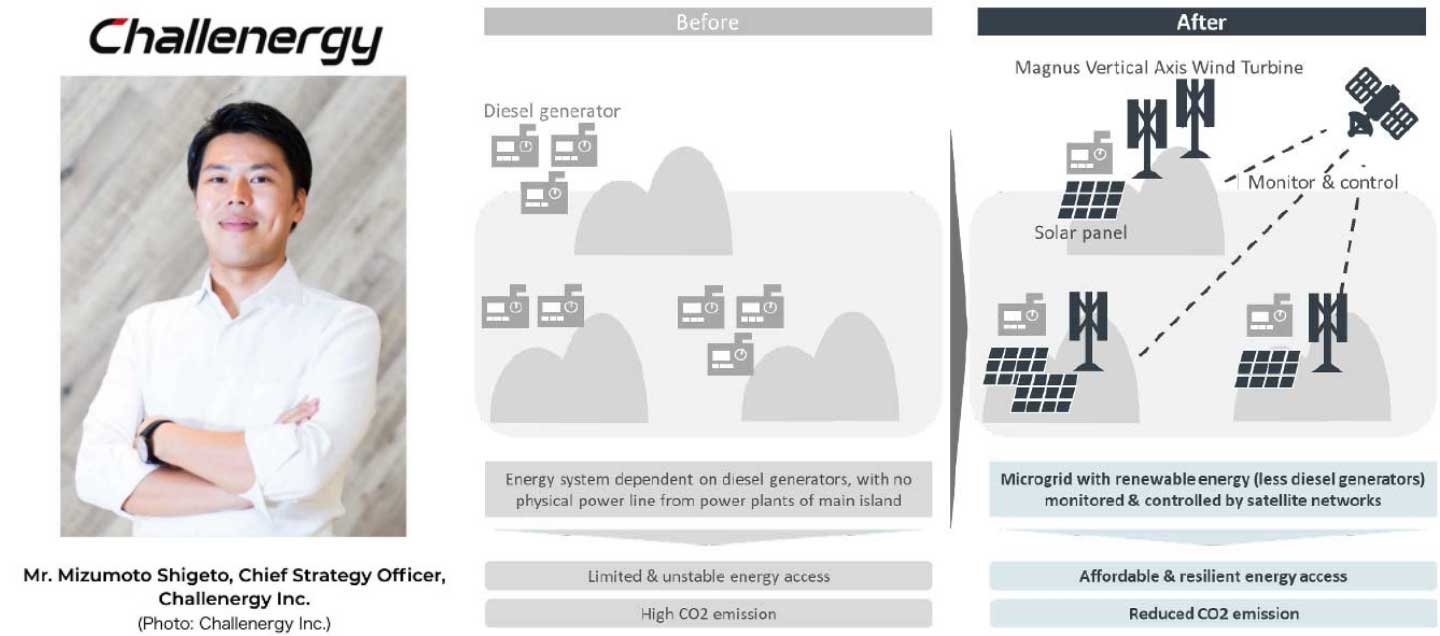
Challenergy aims to establish an accessible and environmentally sustainable distributed energy system (“microgrid”) for remote islands in the Philippines. They plan to provide two solutions for local electricity companies; 1) “Magnus Vertical Axis Wind Turbine (Magnus VAWT)”, a world’s first wind turbine with the combination of magnus force and vertical axis, which is developed by Chellenergy, and 2) Support for the post-installation operations of wind and solar energy system.
First innovative feature and uniqueness of their solutions is “Magnus VAWT” which is the world’s first wind turbine utilizes "Magnus Effect” and allows electricity to be generated even under typhoon. Another unique point is to open up a new market to provide distributed energy system (microgrid) to remote areas with digital technologies.
Challenergy is partnered with Philippines National Oil Company (PNOC) Renewables Corporation which is the only entity examining the possibility of serving renewable energy in remote islands with public-interest.
After the success of the demonstration project in the Philippines, Challenergy will be introduced the same approach to other ASEAN countries such as Indonesia, Malaysia and Viet Nam, which comprise many islands. In addition, Myanmar is another potential country for which we plan to deploy the system.
Please see here for the details of the contents.
Apart from Challenergy’s project, DISG have published 6 other introductions of ADX series including SkymatiX in Cambodia (Agriculture), Toyota Tsusho in Cambodia (Tourism & Mobility), Kobelco in Malaysia (Environment), Medring in Vietnam (Healthcare), Fuso Machine Works in Indonesia (Manufacturing), and Sagri in Thailand (Agriculture), and Please follow the link for more information on each project.
Summit telephone talks and Minister video meeting
between ASEAN countries and Japan
Last month, a lot of high levels (summit or ministerial levels) meetings were held between ASEAN countries and Japan including Vietnam-Japan Summit Telephone Talk*1, Philippines-Japan Summit Telephone Talk*2, Singapore-Japan Summit Telephone Talk*3, and Thai-Japan Minister Video Meeting*4.
On 17th May, 2021, H.E. Suga Yoshihide, Prime Minister of Japan, held a summit telephone talk with H.E. Pham Minh Chinh, Prime Minister of the Socialist Republic of Viet Nam. In the talk, the two leaders discussed; 1) strengthening bilateral relationship toward "Free and Open Indo-Pacific", 2) enhancing strategic economic partnership in various areas such as infrastructure, energy, environment and digital, and 3) working together on the maintenance of peace and stability in the region.
On 19th May, 2021, H.E. Suga Yoshihide, Prime Minister of Japan, held a summit telephone talk with H.E. Rodrigo R. Duterte, President of the Republic of the Philippines. In the talk, the two leaders discussed strengthening bilateral cooperation including the assistance for COVID-19 control measures and concurred on 1) close coordination for the promotion of both a "Free and Open Indo-Pacific" and the "ASEAN Outlook for the Indo-Pacific (AOIP)", 2) working together closely toward the maintenance of peace and stability in the region under the rule of law such as the UNCLOS, and 3) continued coordination for the maintenance of peace and stability in the region.
On 25th May, 2021, H.E. Suga Yoshihide, Prime Minister of Japan, held a summit telephone talk with H.E. Lee Hsien Loong, Prime Minister of the Republic of Singapore. In the talk, the two leaders discussed how to deal with COVID-19 situation and concurred on; 1) close cooperation toward realizing both a "Free and Open Indo-Pacific" and the "AOIP", 2) enhancing cooperation in both economic areas (such as green, digital etc.) and security areas, 3) continued coordination for the maintenance of peace and stability in the region. H.E. Lee told to lift import restrictions on food from Japan which began just after the big earthquake in 2011 and H.E. Suga welcomed the decision.
Last, but not least, on 20th May, 2021, H.E. Kajiyama Hiroshi, Minister of Economy, Trade and Industry, held a ministerial video meeting with H.E. Supattanapong Punmeechaow, Deputy Prime Minister and Minister of Energy, Thailand. In the meeting, Minister Kajiyama explained Japan's policy of supporting various and pragmatic energy transitions in Asia toward achieving decarbonization and green growth in the region. He also expressed Japan’s intention to cooperate for the formulation of Thailand's National Energy Plan 2022 aimed at carbon neutrality in Thailand. The ministers agreed that the two countries will continue to work together closely.
*1 Please see here for the detail of Vietnam-Japan Summit Telephone Talk (Japanese only)
*2 Please see here for the detail of Philippines-Japan Summit Telephone Talk
*3 Please see here for the detail of Singapore-Japan Summit Telephone Talk (Japanese only)
*4 Please see here for the detail of Thai-Japan Minister Video Meeiting (Japanese only)
Editorial Note
We thank everyone for your interest and support. Please look forward to the future webinar series and information dissemination through newsletters and our website, social media, etc.
The next DISG webinar will be held in the Late June. Please look forward to further announcement.
-------------------------------------------
Mr. KOBAYASHI Hirokazu
Chair of AMEICC DISG Task Force
Executive Director, JETRO Singapore



